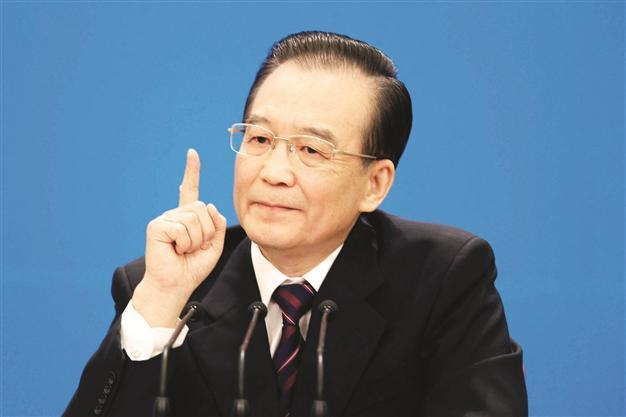China to push reforms to promote its resiliency
BEIJING - REUTERS

China’s outgoing Premier Wen Jiabao addresses the Chinese parliament saying the country will quicken the pace of economic and political reforms to spread wealth and make the country stronger in the face of both internal and external risks. AA photo
China will step up economic and political reforms to spread wealth wider and make growth more resilient in the face of internal and external risks, outgoing Premier Wen Jiabao pledged yesterday after closing the annual meeting of Parliament.
Wen said Beijing would let the yuan float more freely, keep a tight rein on property and inflation risks, deal with debts racked up by local governments and cushion downward external pressures, adding that political reforms were essential for China’s continued economic growth.
“In my final year, our government will have to do several difficult things,” 69-year old Wen told a three-hour news conference, his last at the closing news conference of the National People’s Congress (NPC), over which he has presided for a decade.
“Reform has reached a critical stage. Without the success of political reform, economic reforms cannot be carried out. The results that we have achieved may be lost,” said Wen.
Wen has stood out among China’s leaders as the most persistent advocate of measured relaxation under party control. As he prepares to leave power, he has made a habit of calling much more forthrightly -- though often vaguely -- for political reform.
He retires next year along with President Hu Jintao after a decade in power which has seen China grow to become the world’s second biggest economy, but which is likely to see 2012 deliver the slowest rate of annual growth during their leadership.
Wen opened the annual parliamentary session over a week ago by announcing a cut to China’s economic growth target to 7.5 percent for 2012 from the 8 percent eyed in each of the previous eight years, saying it necessary to help transform the economy.
“Due to the European debt crisis and a shrinking external market, there are downward pressures on the Chinese economy. Under such circumstances, we lowered the growth rate target mainly to allow for structural adjustment,” Wen said.
“We will step-up exchange rate reforms,” he promised, adding that recent activity in Hong Kong currency derivatives markets signalled the value of the yuan “is possibly near an equilibrium level.”
The yuan has been a lightning rod for disputes between China and trading partners, including the United States, which accuse Beijing of holding down the currency to make exports cheaper.
China de-pegged the yuan from the dollar in a landmark move in July 2005 and it has since appreciated some 30 percent against the U.S. currency, though some critics in the West say Beijing still keeps too tight a grip on the yuan.
Lower growth will help tame inflation
Lower growth will help Beijing keep inflation under control, while allowing it to stick to a broadly expansionary monetary policy to ensure a flow of credit to the small and medium-sized firms the government wants to encourage.
Inflation hit a three-year high of 6.5 percent in July and was above the government’s 4 percent target in every month of 2011. Wen has maintained the target for this year.
China’s 800 million workers are mainly low paid and an estimated 10 percent of the population lives on less than $1 per day. They feel the pinch of rising prices acutely.
Wen said home prices, which have started to nudge lower after soaring 10-fold in the last decade, remained far from falling to a reasonable level. Government efforts to curb real estate speculation must be maintained or risk chaos and a property bubble which would harm the economy if it burst, he said.
